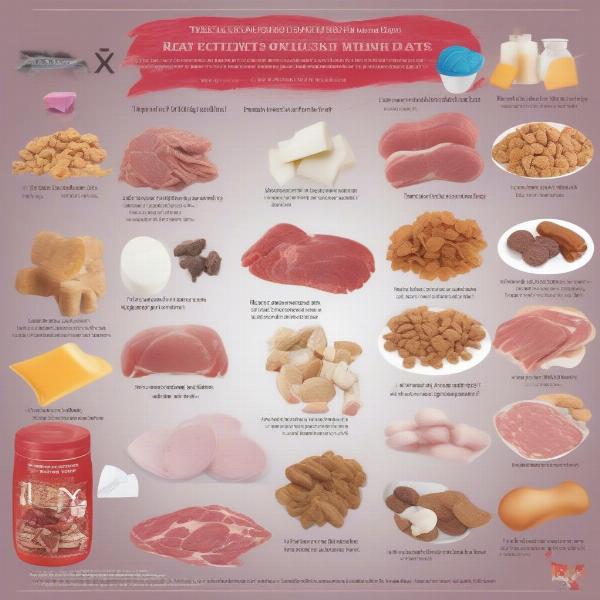Pancreatitis in dogs can be a serious condition, and dietary management is crucial for recovery and long-term health. Finding the right treats for dogs with pancreatitis can be tricky, but it’s essential to provide them with safe and enjoyable snacks. This article will explore suitable treat options, ingredients to avoid, and tips for managing your dog’s diet during pancreatitis.
Choosing the right treats for a dog with pancreatitis requires careful consideration of ingredients. Avoid high-fat treats, as fat is a primary trigger for pancreatic inflammation. Look for low-fat options that are easily digestible. Ingredients like lean protein sources (chicken breast, white fish), and simple carbohydrates (sweet potato, plain rice) are generally well-tolerated. Always consult with your veterinarian for personalized recommendations, as each dog’s case is unique.
Understanding Pancreatitis and Dietary Needs
Pancreatitis is the inflammation of the pancreas, an organ responsible for producing digestive enzymes and insulin. When the pancreas becomes inflamed, these enzymes can leak into the surrounding tissues, causing pain and damage. A low-fat diet is essential for managing pancreatitis, as fat stimulates enzyme production and can worsen the inflammation. This dietary restriction extends to treats, which should be carefully chosen to avoid triggering a flare-up.
What are some good treats for dogs with pancreatitis? Single-ingredient treats made from lean protein or simple carbohydrates are often recommended. Look for treats with minimal processing and no added fats, sugars, or artificial ingredients.
Safe Treat Options for Dogs with Pancreatitis
Several commercially available treats are formulated specifically for dogs with sensitive digestive systems, including those with pancreatitis. These treats are typically low in fat and easily digestible. Look for options that are certified by veterinary nutritionists. Homemade treats can also be a good option, allowing you to control the ingredients and ensure they meet your dog’s specific needs.
“When choosing commercial treats, always check the ingredient list and guaranteed analysis to ensure they are low in fat and free of potentially harmful additives,” advises Dr. Emily Carter, DVM, a veterinary nutritionist.
Ingredients to Avoid in Treats for Dogs with Pancreatitis
Certain ingredients should be strictly avoided when choosing treats for dogs with pancreatitis. These include high-fat meats (beef, pork, lamb), dairy products, processed foods, and anything containing artificial colors, flavors, or preservatives. Table scraps are also a no-go, as they are often high in fat and can be difficult for a dog with pancreatitis to digest.
 Ingredients to Avoid in Dog Treats for Pancreatitis
Ingredients to Avoid in Dog Treats for Pancreatitis
“Even small amounts of high-fat foods can trigger a pancreatitis flare-up,” warns Dr. Sarah Miller, DVM, a specialist in canine internal medicine. “It’s crucial to be vigilant about your dog’s diet, including treats.”
Tips for Managing Your Dog’s Diet During Pancreatitis
low fat treats for dogs with pancreatitis are only part of the equation. Managing pancreatitis requires a comprehensive approach that includes a strict low-fat diet, regular veterinary check-ups, and medication as prescribed. It’s important to work closely with your veterinarian to develop a long-term management plan for your dog’s condition. This may include transitioning to a specialized low-fat dog food and providing frequent small meals throughout the day to prevent overstimulation of the pancreas.
dog treats for dogs with pancreatitis can be a valuable tool for training and positive reinforcement, even for dogs with pancreatitis. Just remember to choose them wisely and incorporate them into the overall dietary plan.
Conclusion
Finding appropriate treats for dogs with pancreatitis requires careful attention to ingredients and fat content. By selecting low-fat, easily digestible options and avoiding high-fat ingredients, you can provide your dog with enjoyable snacks without compromising their health. Always consult your veterinarian for personalized recommendations and guidance on managing your dog’s pancreatitis.
FAQ
- Can dogs with pancreatitis have any treats at all? Yes, but they must be low in fat and easily digestible.
- What are some good homemade treat options? Small amounts of cooked chicken breast, plain rice cakes, or baked sweet potato are good choices.
- Are there commercial treats specifically for dogs with pancreatitis? Yes, several brands offer low-fat and easily digestible treats.
- Can I give my dog table scraps as treats? No, table scraps are often high in fat and can worsen pancreatitis.
- What should I do if my dog experiences a pancreatitis flare-up after eating a treat? Contact your veterinarian immediately.
- How can I find the fat content of a dog treat? Check the guaranteed analysis on the product label.
- Are all low-fat dog treats suitable for dogs with pancreatitis? Not necessarily. Some low-fat treats may contain other ingredients that could irritate the pancreas. Consult your veterinarian for specific recommendations.
air fryer state fair corn dogs are definitely not appropriate for a dog with pancreatitis! Remember to keep your furry friend’s diet strictly low-fat.
wholesale hot dogs are also not recommended for dogs with pancreatitis. Stick to healthy, low-fat options.
lsu corn dogs While these might sound tempting for us, remember that high-fat foods are off-limits for dogs with pancreatitis.
ILM Dog is a leading international online resource dedicated to providing expert advice and information on all aspects of dog care and well-being. From breed selection and puppy care to senior dog health and training tips, ILM Dog offers a wealth of resources for dog owners worldwide. With a focus on health, nutrition, and behavior, we help you provide the best possible care for your canine companion. Contact us today at [email protected] or +44 20-3965-8624 to learn more.